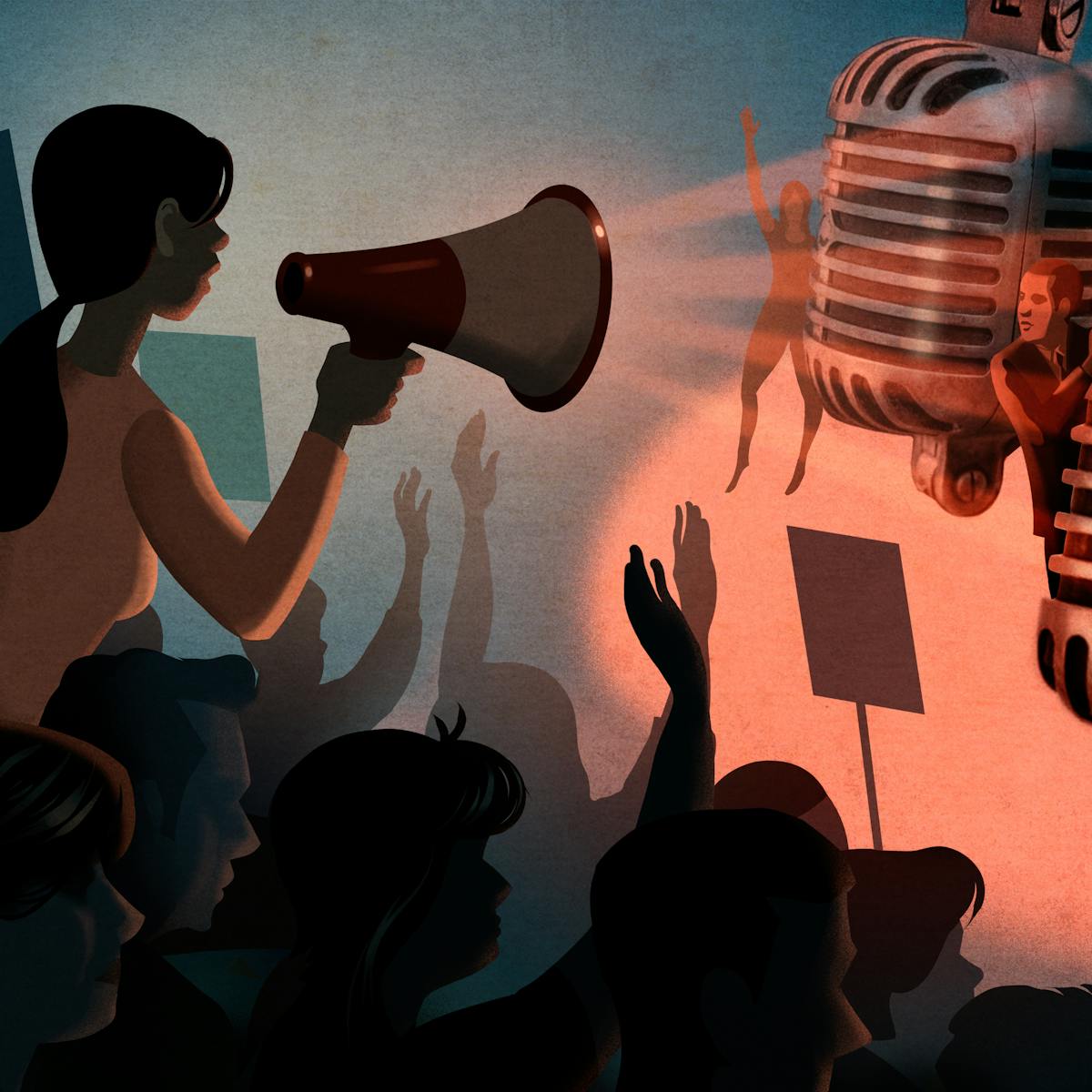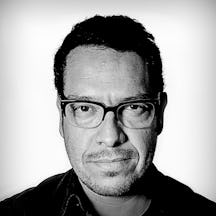Rather than ask for help, Lucia Osborne-Crowley’s first instinct after being raped was to hide. Shame kept her silent for ten years, but #MeToo gave her the courage to ask for help. She has discovered that speaking out, and listening when others do the same, is key to weakening shame’s power.
Fighting shame by speaking out
Words by Lucia Osborne-Crowleyartwork by Eduardo Rubioaverage reading time 7 minutes
- Serial

At its core, shame is about isolation. It is the emotion we feel when we believe we have failed to meet society’s expectations. Naturally, given that the feeling itself hinges on the real or imagined approbation of others, our instinct when we feel ashamed is to keep it to ourselves, to hide, and so minimise the feeling.
On the night I was raped by a stranger in 2007, it didn’t occur to me that I might tell someone what had happened. Honestly, the thought never crossed my mind. I was bruised and bleeding and sore, and my first thought when I ran away from my attacker and took stock of my injuries was not “I need help” but “How can I cover this up?”
My friends found me shortly after the rape. They knew something terrible had happened, but I wouldn’t tell them anything. I just remember sliding onto the floor in a dusty nook on Pitt Street, in Sydney’s central business district, and shaking my head violently every time one of them asked me what he had done. When I did answer them, all I remember saying is, “It hurts.”
Through heavy sobs, I got myself into a taxi and away from my friends as fast as I could. I sneaked into my house and made sure no one would notice me. I hid the bruises from my friends and gym coaches and parents for weeks. It was the beginning of ten years of silence.
I knew the shame of admitting what had happened would hurt me more than the rape did, so I kept it to myself.
People ask me now: Why didn’t you call the police? Why didn’t you go to a doctor? And honestly, I can’t tell you. It was never a conscious thought that I would keep this a secret. It was just my immediate reaction.
I knew that the shame of admitting what had happened would hurt me more than the rape did, so I kept it to myself. Or, more accurately, I kept it from myself. I didn’t admit it had happened for years, even in my own head. Trauma researcher Bessel van der Kolk says the greatest source of our suffering is the lies we tell ourselves. He’s right.
The power of saying “me too”
I thought that hiding was the best way to fend off the sharpest sting of shame, but I was wrong. Researchers who study shame say that the very best antidote is – unhelpfully – the one thing that this emotion convinces us we cannot do: seek human connection and voice our shame. When faced with empathy, shame cannot survive.
In an audiobook recorded years before a global movement would take place, Brené Brown says: “The two most powerful words when we are in struggle? Me too.”
Reaching out to another person and saying, “Something terrible happened to me,” and hearing that person say, “I understand, it wasn’t your fault,” is the only path out of shame.
Each time we speak about our shame, we weaken it.
Psychotherapy – or talk therapy – is considered to be one of the most helpful medical interventions when someone is plagued by shame, for the same reason. Each time we speak about our shame, we weaken it. Having a safe space in which a therapist is able to hear the stories we try to hide, allowing that therapist to contain and interrogate our shame, is such an important step in recovery.
It’s also why the #MeToo movement, which has encouraged women and girls to speak up about sexual assault and harassment without feeling ashamed, has caused a tectonic shift in our political culture. Seeing women across the world admit to being victims of abuse, to see them fight through their shame in order to connect with other survivors, has been world-altering for many women. It certainly has been for me.
In fact, it’s exactly what made me realise that I might one day be able to share my shameful secret with someone. That I might be able to ask for help.
Finding the courage to voice my shame
#MeToo was originally created by activist Tarana Burke and reinvigorated by a Twitter thread started by actress Alyssa Milano in 2017. As the movement grew stronger, my physical health deteriorated. I found myself hospitalised with a terrible flare-up of Crohn’s disease, or endometriosis, or both. I lost seven kilos in a few short weeks and I couldn’t get out of bed. Finally I decided to tell someone what had happened to me.
The first person I told was my psychotherapist, to whom I owe more than I could ever begin to express. I told him the story and he listened, and he nodded, and he made me feel safe, and when I finished he said: “It’s not your fault.”
Then he said: “Who else knows about this?” And I said: “Just you.” I will never forget the devastation on his face when I said those words.
After I told my therapist about the assault, he helped me to tell the surgeons and doctors treating my chronic illnesses. When I told those doctors, they helped me find physiotherapists and psychologists who specialise in treating sexual trauma.
Before long, a whole new world had opened up. It was full of compassion and understanding, and of dedicated professionals who have committed themselves to helping people like me step away from shame. It has changed everything. I published an article about my assault, which I then turned into a book.
Shame still gets me some days, but I can say for sure that human connection and empathy are the things that saved me.
Let’s keep talking about shame
I am incredibly lucky that I am middle-class, educated and white – all of which made it statistically much more likely that my story would be believed. And it was. I’m also profoundly lucky that I had a psychotherapist I trusted. I had a job that paid me enough to spend AU$150 a week to see him. If those things hadn’t been true, I might never have crawled out of my shame spiral.
That’s why I want us to talk about shame. Every day. All the time. Because we shouldn’t have to be able to afford an expensive therapist or be from a certain background to be freed from shame. Empathy is free. Connection is free. Shame is at once so destructive and so easy to fix. If we commit to talking about it more, we will get there.
Empathy is figuring out how to bring difficulty into the light so it can be seen.
The first step is to keep encouraging our friends and family to talk about their shame. To create a space where they can give voice to whatever is trapped inside them.
In her meditation on the nature of empathy, the writer Leslie Jamison says: “Empathy isn’t just remembering to say ‘that must really be hard’ – it’s figuring out how to bring difficulty into the light so it can be seen at all.” Empathy isn’t just listening, Jamison writes, it’s asking the questions whose answers need to be listened to.
Let’s ask the questions we are afraid to ask, and tell the stories we are afraid to tell, in the knowledge that shame can only devour us if we feed it the silence it needs to survive.
About the contributors
Lucia Osborne-Crowley
Lucia Osborne-Crowley is a writer and journalist. Her first book, ‘I Choose Elena’, was published in 2019. Her second book, ‘My Body Keeps Your Secrets’, will be published in 2020. Her news reporting and literary work has appeared in Granta, GQ, the Sunday Times, HuffPost UK, the Guardian, ABC News, Meanjin, The Lifted Brow and others.
Eduardo Rubio
Eduardo Rubio is a Mexican-born artist and illustrator living in Madrid. His work mainly involves collaboration with publishing houses and brands; he also works on personal projects, which he exhibits in galleries and museums.

